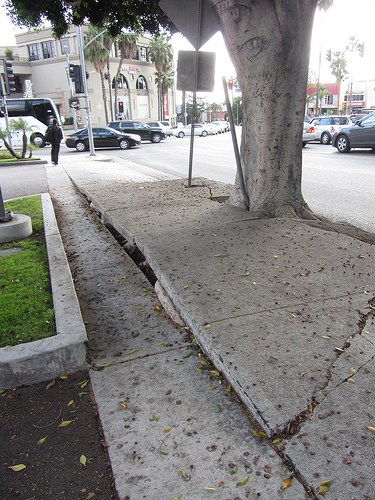At yesterday's L.A. City Council Budget and Finance Committee, councilmember Paul Koretz proposed removing prioritization criteria that links sidewalk repair to Vision Zero.
SBLA readers may be aware that, resulting from the Willits lawsuit settlement, the city of L.A. has embarked on a 30-year program to repair ailing sidewalks.
The budget committee was discussing the Bureau of Engineering's scoring system (staff report) for prioritizing sidewalk repair projects. The proposed city would have given 15 points out of a possible 145 for sidewalk repairs within 500 feet of the Vision Zero High Injury Network intersections or corridors. The HIN is the six percent of L.A. streets where 65 percent of all deaths and severe injuries take place.
In discussing the criteria (audio - item 12) Koretz asserted that proximity to the High Injury Network was "irrelevant." While the HIN is not a perfect measure of pedestrian need or equity, it does represent places where people are actually walking - and getting injured and killed - in higher numbers than other parts of the city.
Investing in Place, which submitted a well-reasoned comment letter on the item (council file 14-0163-S3), argues that the sidewalk repair program is not sufficiently tied into the city's transportation priorities. Sidewalk project planning and implementation take place in the Public Works Department, not the Department of Transportation. Sidewalk repair does not take into account special pedestrian zones, such as pedestrian areas designated in Mobility Plan 2035.
Responding to Koretz' move to further untie sidewalk work from walking, Investing in Place Deputy Director Naomi Iwasaki told SBLA:
It is concerning that Los Angeles sidewalks and the people that rely on them are consistently separated from overall transportation planning and funding conversations. Removing the Vision Zero High Injury Network from the city's proposed sidewalk repair program prioritization criteria is another indication that our city sees sidewalks as separate from traffic safety and not a part of our efforts to improve the Los Angeles transportation system.
At yesterday's meeting, councilmembers Koretz, Paul Krekorian, and Bob Blumenfield all voted to approve the anti-Vision Zero amendment. The revised criteria will need to be approved by the full city council before taking effect.






